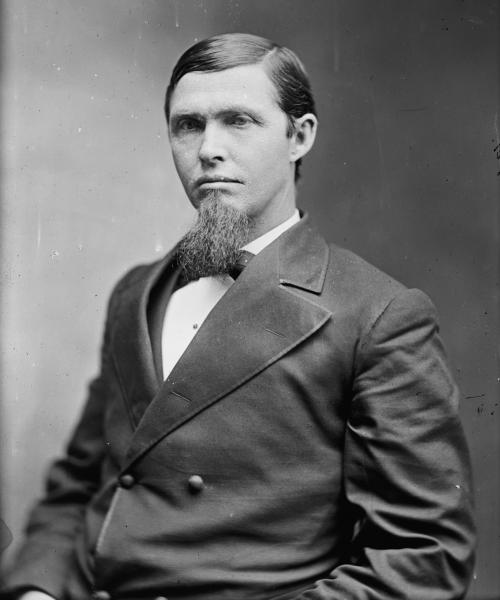By Matthew E. Stanley, University of Cincinnati
Biographical Information:
- Date of birth: October 12, 1837
- Place of birth: Berkshire, Ohio
- Claim to fame: Three-term Kansas senator and antislavery "Free-Soil" advocate
- Political affliations: Republican Party
- Date of death: December 20, 1891
- Place of death: Washington D.C.
- Final resting place: Maplewood Cemetery, Emporia, Kansas
Preston B. Plumb was an antislavery “Free-Soil” advocate, a Union Army officer during the Civil War, a successful businessman, and a three-term senator from the state of Kansas, where he is considered a founding figure.
Plumb was born of Yankee stock to antislavery parents in Berkshire, Ohio, on October 12, 1837. He attended school in nearby Marysville, Ohio, and worked in his father’s wagon shop. After attending Kenyon College for three years, Plumb found an outlet for his antislavery views as a newspaperman in Marysville and later in Xenia. The latter paper, the Xenia News, was sympathetic to the Free-State cause in “Bleeding Kansas,” where political and social conflict was occurring between proslavery “border ruffians” and antislavery “jayhawkers.”
By June 1856 Plumb decided to make a preliminary trip to Kansas with the intent of moving there permanently in order to support the Free-State movement. He visited antislavery settlements in Fort Leavenworth, Lawrence, and Topeka, before returning to Ohio. Upon his return to the territory later that year, the 18-year-old Plumb brought 10 recruits and two wagons into Kansas Territory, loaded with armaments including a brass cannon. Plumb and his men, called “Grizzlies,” delivered their military cargo to Topeka on September 25, then made their way up the Kansas River, where they established the small (and soon abandoned) settlement of Mariposa. Plumb also invested in and became one of the founders of the town of Emporia.
...the 18-year-old Plumb brought 10 recruits and two wagons into Kansas Territory, loaded with armaments including a brass cannon.
Plumb soon sold his interest in the Xenia News and began publishing with the Herald of Freedom in Lawrence, before establishing the Kanzos News in June 1857. After serving on the convention of the Leavenworth Constitution in February 1858, Plumb split time between Kansas and Cleveland, Ohio, where he entered law school. His legal training paid quick dividends, as Plumb worked first as a reporter for the Kansas Supreme Court before being elected to the state legislature in November 1861.
Feeling an urge to serve in what was becoming an increasingly prolonged and bloody civil war, Plumb helped raise the 11th Kansas Infantry in the summer of 1862. Mustered in as a captain of Company C, Plumb was eventually promoted to major, and then lieutenant colonel. His regiment fought entirely in the trans-Mississippi and Far West, where he saw combat at Prairie Grove and was active in campaigns against raids led by Stan Watie in 1863 and Sterling Price in 1864, before being mustered out in September 1865.
Plumb solidified his role as one of Kansas’s founders after the Civil War. Immediately after the war’s end, he practiced law in Emporia, founding the law firm Ruggles & Plumb in 1867. A year later he was again elected to the Kansas state legislature. He became president of the Emporia National Bank in 1873 and promoted the extension of the Missouri, Kansas, and Texas Railway in the state of Kansas. On the personal side of his life, he married Caroline A. Southwick (whose father was an underground railroad operator), of Ashtabaula, Ohio, on March 8, 1867.
Building on his reputation as a steady family man and successful businessman with longstanding political experience, Plumb was elected as a Republican to the United States Senate in 1877, at the dusk of Reconstruction. Yet during his time in the Senate, Plumb was at the fore of national politics. He developed a reputation as a workhorse and was known for skipping meals and laboring throughout the non-working hours. This industrious capacity is evident in his Senate record. Indeed, Plumb served as chairman of the Committee on Public Lands and was integral in passing the legislation that opened what is now the state of Oklahoma for white migration. He also led a minority wing of the Republican Party against William McKinley’s tariff bill, being one of the few members of his party who voted against it in its final vote. Plumb was not a Radical Republican, and as such, he personally denounced proposals including Ulysses S. Grant’s Force Act, which empowered the president to use federal “force” to uphold the Fifteenth Amendment for African Americans in the postwar South. Plumb was reelected to the Senate twice (in 1883 and 1888), becoming in his third term the first Kansan ever elected without a dissenting vote. The unanimous vote was possible because prior to the Seventeenth Amendment in 1913, U.S. Senators were selected by their state legislatures, not by direct popular vote.
Senator Hannibal Rivers, the title character in David D. Lloyd and Sydney Rosenfeld’s popular 1890 play, “The Senator,” was modeled after Plumb.
Plumb fell ill in the spring and summer of 1891, in the midst of a great political contest between the ascendant Populists and Plumb’s Republicans in Kansas. He was advised by doctors to retire from politics and convalesce in Europe. He did neither, and he died on December 20, 1891, in Washington D.C., and was buried in Emporia’s Maplewood Cemetery. Plumb has been remembered as a founding figure in Kansas history and a notable national figure during his time in the Senate.
Suggested Reading:
Connelley, William E. The Life of Preston B. Plumb, 1837-1891. Chicago, IL: Browne and Howell Co., 1913.
Connelley, William E. A Standard History of Kansas and Kansans. Vol. 1-5. Chicago: Lewis Publishing Co., 1918. Transcribed by Carolyn Ward, 1998.
Biographical Directory of the United States Congress, 1774-2005. Washington, D.C.: United States Government Printing Office, 2005.
Cite This Page:
Stanley, Matthew. "Plumb, Preston B." Civil War on the Western Border: The Missouri-Kansas Conflict, 1854-1865. The Kansas City Public Library. Accessed Thursday, April 25, 2024 - 14:53 at https://civilwaronthewesternborder.org/encyclopedia/plumb-preston-b


